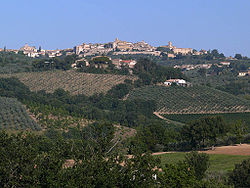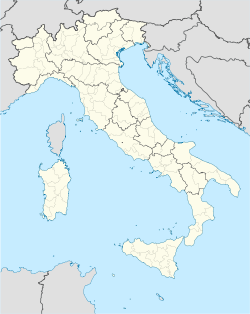- Montefalco
-
Montefalco — Comune — Comune di Montefalco Location of Montefalco in Italy Coordinates: 42°53′N 12°39′E / 42.883°N 12.65°ECoordinates: 42°53′N 12°39′E / 42.883°N 12.65°E Country Italy Region Umbria Province Perugia (PG) Frazioni Camiano, Casale, Cerrete, Fabbri, Fratta, Madonna della Stella, Montepennino, Pietrauta, San Clemente, San Marco, Torre di Montefalco, Turrita Government - Mayor Valentino Valentini (since June 2004) Area - Total 69 km2 (26.6 sq mi) Elevation 473 m (1,552 ft) Population (2007) - Total 5,702 - Density 82.6/km2 (214/sq mi) Demonym Montefalchesi Time zone CET (UTC+1) - Summer (DST) CEST (UTC+2) Postal code 06036 Dialing code 0742 Patron saint St. Fortunatus, St. Clare of Montefalco Saint day June 1 (St. Fortunatus), August 17 (St. Clare) Website Official website Montefalco is a town and comune in the central part of the Italian province of Perugia, (Umbria) on an outcrop of the Colli Martani above the flood plain of the Clitunno river, 7 km (4 mi) SE of Bevagna, 11 km (7 mi) SW of Foligno, and 9 km (5.5 mi) NW of Trevi.
Contents
History
The town has been actively settled since the times of the Umbri. It has been under the successive domination of the Romans, Lombards, being called Coccorone in the Middle Ages. In 1249 it was sacked by Frederick II, but was soon rebuilt with the modern name. from the 13th century it had been a free comune under the domination of local nobles and merchants, but later, as with many other Umbrian locales, the comune gave way to government by a Signoria — in this case, that of the Trinci from the nearby Foligno (1383–1439). In 1446 it fell under the rule of the Papal States where it remained until the unification of Italy in 1861.
St. Clare of Montefalco, sometimes known as St. Clare of the Cross, was born in Montefalco and died there in 1308.
Main sights
Montefalco today has several churches, some in the Romanesque, some in the Gothic and some in the Renaissance style. Historically, the most important is the church of San Francesco, which is now the town's museum, and, given its collection of art and artifacts, one of the most important museums in Umbria. The church is notable for its fresco cycle on the life of St. Francis, from the Florentine artist Benozzo Gozzoli (1450–1452). Other artists represented in the museum include Perugino, Melanzio, Pier Antonio Mezzastris, Antoniazzo Romano and Tiberio d'Assisi.
Among the other churches found inside and outside the town walls are Sant'Agostino, Santa Clara, Santa Illuminata and San Fortunato, the latter, built in the 4th century over the tomb of Fortunatus of Spoleto and renovated in 15th century, had frescoes by Gozzoli and Tiberio d'Assisi.
The 13th century Palazzo Comunale ("Town Hall") has a mullioned window from the original edifice and a 15th century portal. Also notable are the gates in the walls, including Porta Sant'Agostino, Porta Camiano and Porta Federico II.
Culture
The comune of Montefalco and a small area of the comune of Bevagna constitute the regulated geographical area for Montefalco wines. Every year around Easter, the town sponsors a major festival called Settimana Enologica — or Wine Week — where visitors can enjoy the principal wines produced in the area including the comparatively simple red table wine, Montefalco Rosso, the more complex DOCG red wines Sagrantino, for which the area is famous, and the Montefalco Sagrantino secco.
External links
- Commons: Convento di San Fortunato with frescoes by Gozzoli
- Official website
- Tourist Website
- Montefalco Wine Consortium
- Tutto Montefalco
- Bill Thayer's site (including Urbini's Spello, Bevagna, Montefalco)
Umbria · Comuni of the Province of Perugia Assisi · Bastia Umbra · Bettona · Bevagna · Campello sul Clitunno · Cannara · Cascia · Castel Ritaldi · Castiglione del Lago · Cerreto di Spoleto · Citerna · Città della Pieve · Città di Castello · Collazzone · Corciano · Costacciaro · Deruta · Foligno · Fossato di Vico · Fratta Todina · Giano dell'Umbria · Gualdo Cattaneo · Gualdo Tadino · Gubbio · Lisciano Niccone · Magione · Marsciano · Massa Martana · Monte Castello di Vibio · Monte Santa Maria Tiberina · Montefalco · Monteleone di Spoleto · Montone · Nocera Umbra · Norcia · Paciano · Panicale · Passignano sul Trasimeno · Perugia · Piegaro · Pietralunga · Poggiodomo · Preci · San Giustino · Sant'Anatolia di Narco · Scheggia e Pascelupo · Scheggino · Sellano · Sigillo · Spello · Spoleto · Todi · Torgiano · Trevi · Tuoro sul Trasimeno · Umbertide · Valfabbrica · Vallo di Nera · ValtopinaCategories:- Cities and towns in Umbria
- Communes of the Province of Perugia
- Hilltowns in Italy
- Hilltowns in Umbria
- Wine regions of Italy
- Cittaslow
Wikimedia Foundation. 2010.


